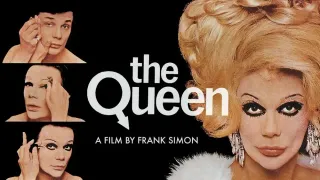October 3, 2014
Gone Girl
Charles Nash READ TIME: 6 MIN.
"I suppose these questions stormcloud over every marriage: What are you thinking? How are you feeling? Who are you? What have we done to each other? What will we do?"
This passage from the third page of Gillian Flynn's novel, "Gone Girl," is masterfully translated to the screen within the opening shot of David Fincher's astonishing film adaptation; the top of a woman's head resting on a pillow from the perspective of a male character lying next to her. He gently runs his fingers through her golden blonde-hair, stating in an internalized monologue that he'd like to crack open her skull open and scavenge through her mind to uncover the answers to his questions.
The woman lifts up her head and peers into the lens as if she's overheard these troubling thoughts, practically breaking the fourth wall by making the viewer feel complicit in observing her through this particularly sleazy form of the male gaze.
"Gone Girl" starts off with this gorgeously crafted, yet psychologically queasy, introduction and only gets more relentlessly depraved from there. It's a maliciously engrossing piece of filmmaking that left me feeling filthy, as if I had been on a waterslide bursting with currents of toxic waste, reveling in every nasty and exhilarating turn that the ride took me down.
The viewer is introduced to the film's protagonists through two alternating timelines. In the present, Nick Dunne (Ben Affleck) returns to his suburban home in Missouri on the day of his fifth wedding anniversary, but his beautiful wife, Amy (Rosamund Pike) is nowhere to be found. After discovering what appears to be a crime scene in his living room -- an overturned ottoman and numerous shards of glass scattered across the floor -- Nick calls the police and informs them that his spouse is missing. As the investigation progresses, however, Nick's strange behavior starts to set both detective Rhonda Boney (Kim Dickens) and officer Jim Gilpin (Patrick Fugit), along with the rest of the general public, on edge, resulting in him becoming the primary suspect. Cue the media frenzy.
In a series of flashbacks that intertwine with the ongoing case, we see the relationship from Amy's point of view as she narrates selected passages from her diary, dating all the way back to the night that she first meets Nick at a party in New York City. Their relationship initially seems to blossom in a conventional manner: They develop their own romantic gestures, flirtatiously banter with one another, and even have sex in public locations, like their local bookstore. However, over the course of five years, their love for one another begins to curdle as they become consumed by anger and disappointment. One heated exchange ends with Nick shoving Amy onto the floor, resulting in her stating that she's "become frightened of [her] own husband."
By no means would I want to spoil the deviously clever plot-twists that fiendishly unravel throughout the course of the movie's briskly paced 149-minute runtime, but keeping everything under wraps restricts me from analyzing the more controversial themes that lie within the oozy black heart of the picture. Then again, as with all films, the journey leading up to a big reveal is just as vital to the payoff, especially when it comes to converting an international bestseller to the big screen -- a novel that's been read by millions of people, all of whom know exactly how the plot will unfold before they've even entered the theater.
Speaking as one of those who read the novel before I saw the film, "Gone Girl" is one of the most immensely satisfying book-to-film adaptations I've seen in years. Fincher's meticulous, cold-blooded direction meshes perfectly with the dark tone of the twisted source material, and Flynn herself makes an assured screenwriting debut by translating her crackling page-turner into a similarly venomous script.
Equally important is recognizing the fact that regardless of whether you've read the book or walk into the movie cold, "Gone Girl" succeeds as a film for purely cinematic reasons. If it had been cobbled together in a sloppy, lifeless manner that displayed no personality of its own (i.e. Ron Howard's adaptation of "The Da Vinci Code"), it could have been a disaster.
This isn't the first time Fincher's taken on the task of adapting a work of fiction. His rendition of "Fight Club" is not only a scrupulously faithful visual interpretation of Chuck Palahniuk's novel (apart from a tweaked ending), but also one of the most electrifying films of the 1990s, and his last picture, "The Girl with the Dragon Tattoo," was a gripping, if unnecessary and overlong, remake of the Swedish film based on the late Stieg Larsson's bestseller. With "Gone Girl," it's evident that Fincher's gotten his inspirational groove back.
Nearly every shot is framed within a stylishly methodical composition, with the digital cinematography providing an eerie, foreboding sense of dread. Fincher saturates a majority of his images with a gloomy shade of yellow, particularly during the scenes between Nick and Amy, to accentuate their false sense of happiness as a couple. It's an aesthetic approach that not only provides the film with a polished visual flair, but also metaphorically emphasizes how the characters have become trapped within their own sticky web of lies.
The film is also deeply enhanced by the original score composed by Trent Reznor and Atticus Ross, this being their third musical collaboration for a Fincher film. Alternating between chilly forms of ambience to menacing crescendos of electronic drones, the soundtrack becomes a deeply moving character in and of itself. One instance in particular, where it plays a key role in emphasizing the film's most gruesome act violence, is so viscerally intense that it becomes even more frightening than the graphic images of blood-gushing savagery depicted on screen, which are more than a little shocking, to say the least.
As for the uniformly excellent cast, everyone is at the top of their game. Affleck who's no stranger to being under cynical forms of scrutiny from the media, gives one of the best performances of his career as Nick, who's as dopey and narcissistic as he is intriguingly enigmatic. In some ways, it almost feels as if Affleck's poking fun at how people perceived him as a smug jerk ten years ago with his 'Bennifer' phase and seemingly non-stop array of flops. Yet, beneath Nick's layers of smarm, Affleck's able to emit this character's pain and vulnerability merely through the sorrowful look in his eyes.
Fresh off of her astonishing breakthrough performance in the HBO series "The Leftovers," Carrie Coon is sensational as Nick's twin sister Margot, who balances the tricky position of alternating being both the funniest and most authentically emotionally raw character of the bunch. Kim Dickens also delivers a great, understated performance as Rhonda Boney, who brilliantly maintains a sense of authority by shifting between the subtlest portrayals of good-cop/bad-cop in recent memory. Even Tyler Perry, who seems like a bizarre bit of casting for a Fincher film, provides a solid dramatic turn here as Tanner Bolt, Nick's lawyer, who has an infamous reputation for defending clients who are almost always guilty.
That being said, as stellar as the entire cast is, the film belongs to Rosamund Pike, who, after several years of portraying a variety supporting characters, finally gets to show the world what she's capable of in a starring role, and she's an absolute revelation as Amy. Unfortunately, I can't even go into detail as to what makes her performance so outstanding without spoiling a great deal of the plot, so I'll restrain myself and just say that it's a tremendous performance that requires a lot from her as an actor, and she nails it.
Guaranteed to spark fierce debates on the subjects of relationships, marriage, gender roles, misogyny, misanthropy and a whole slew of other topics, just like the novel upon which its based, "Gone Girl" is not an easy picture to stomach. It's wildly over-the-top, sadistically funny, and relentlessly entertaining, but it's never pleasant. In fact, a majority of it is downright cruel.
And yet, I loved every sick, twisted minute. As a piece of pulp fiction that gives viewers a lot to chew on while consistently delivering its fair share of sleazy thrills, "Gone Girl" is a triumph. It's a terrifying thriller, a sickeningly funny satire, and a salacious guilty pleasure all wrapped up into one movie. Rarely has a film left such a sour taste in my mouth that felt so deliciously satisfying.






